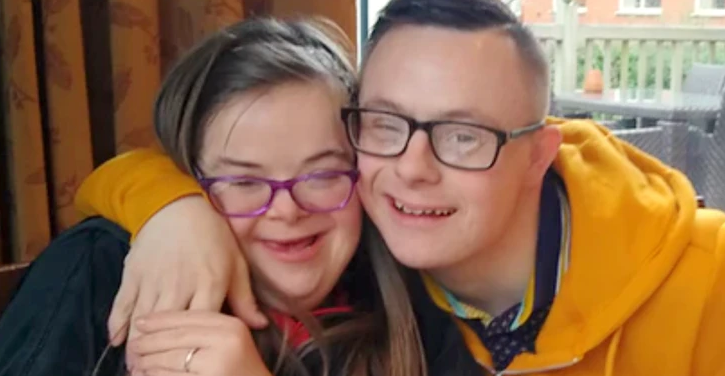Date set for High Court hearing in landmark Down's syndrome case

The date has been set for a hearing at the High Court in a landmark legal challenge against abortion laws that discriminate against people with Down's syndrome.
The High Court will hear the challenge against disability-selective abortion on 6 July.
The case against the Government has been brought by Heidi Crowter, 25, who has Down's syndrome, and Máire Lea-Wilson, whose 23-month-old son Aidan has Down's syndrome.
Lea-Wilson says she was pressured to have an abortion when a 34-week scan revealed her son had Down's syndrome.
At present, the time limit for abortions in England, Wales and Scotland is capped at 24 weeks, but if the baby has a disability like Down's syndrome, cleft lip or club foot, it can be legally aborted up to birth.
According to the campaign group Don't Screen Us Out, there were 3,183 disability-selective abortions across England and Wales in 2019, with 656 of these following a prenatal diagnosis of Down's syndrome.
The legal challenge coincides with recent criticism from the UN Committee on the Rights of Persons with Disabilities, which recommended that the UK change its abortion law in order not to discriminate again babies with disabilities.
Crowter said, "The law says that babies shouldn't be aborted up to birth, but if a baby is found to have Down's syndrome, it can be aborted up until birth. This is the current law in the UK and I think it's not fair.
"People like me are considered to be 'seriously handicapped', but I think using that phrase for a clause in abortion law is so out of date."
She added, "I hope we win. People shouldn't be treated differently because of their disabilities, it's downright discrimination."
Lea-Wilson, 32, said: "I have two sons that I love and value equally, but the law does not value them equally. This is wrong and so we want to try and change that.
"My motivation for taking this joint legal action with Heidi has always been simple. As a mother, I will do all that I can to ensure the fair and equitable treatment of my son, Aidan."
She said that different legal time limit for babies with disabilities "sets the tone for discrimination against people with Down's syndrome which starts before they are born and continues throughout their life with devastating consequences".
"What does this law say to people like my son? That his life isn't as valuable as his older brother's? How will that make him feel? How will I explain it to him?" she said.
She added, "We proclaim that we live in a society which values those with disabilities, that everyone deserves a fair and equal chance at life, regardless of their ability status. This law undermines that narrative, does it really have a place in 2021?
"Aidan is almost 2 now, and he amazes me. He makes us laugh every single day. He has shown us so much about joy, tenacity and the inextricable worth of life. I wouldn't change a single thing about him."
Lynn Murray, spokesperson for Don't Screen Us Out and mother of Rachel who has Down's syndrome, said: "By stating that disability is grounds for termination, section 1(1)(d) of the Abortion Act, promotes inequality.
"The provision in the Abortion Act harks back to a time when we thought it was better for people with disabilities not to be part of our society. We're a far more progressive society now, we realise that diversity is healthy, and all of our laws should reflect that."











